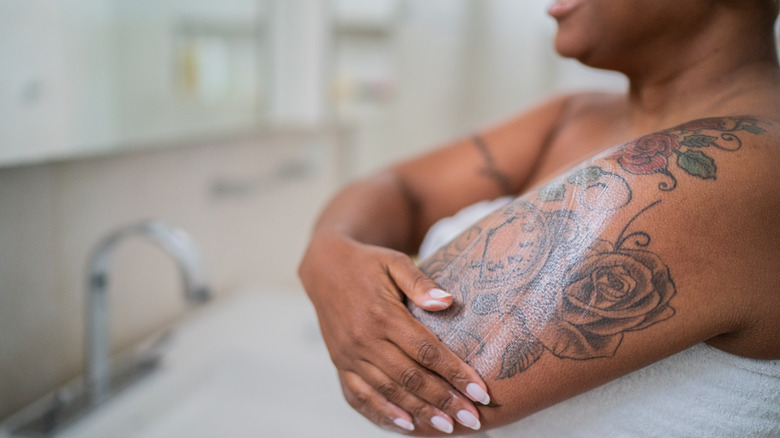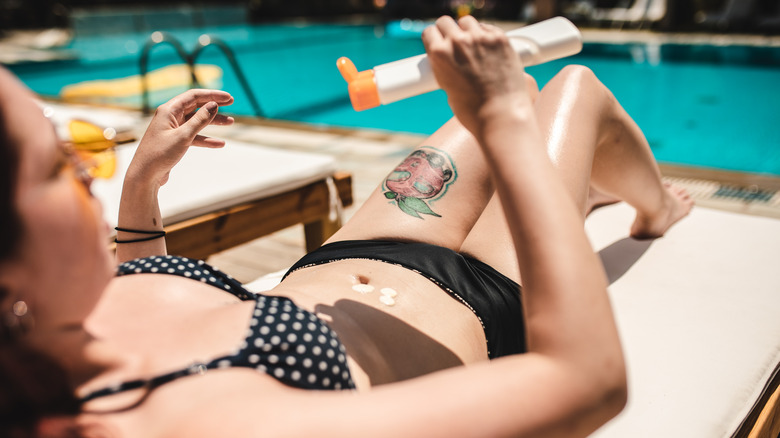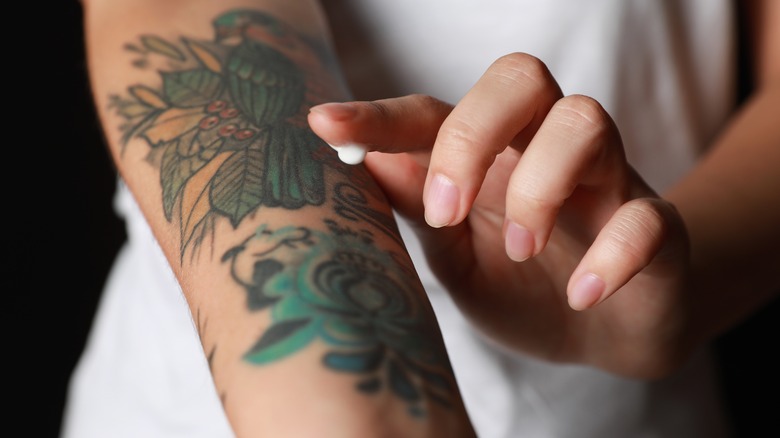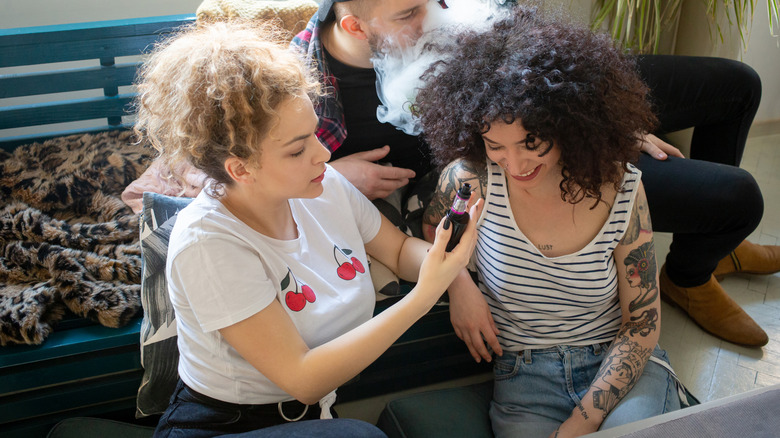6 Reasons Your Tattoo May Be Fading (& How To Stop It)
Tattoos are meant to be permanent pieces of wearable art that we can carry on our bodies forever. But what happens when this art begins to fade and lose its vibrancy at an alarming rate? The answer may lie in how you take care of your tattooed skin, and also how you take care of yourself. No tattoo is going to be able to go a lifetime without some fading, but if you notice your pieces fading faster than normal there may be a bigger issue at hand.
Stories and Ink explained that tattoos fade over time naturally because macrophage cells in our immune system absorb the tattoo ink in our skin over time, which leads to fading. Other elements such as sunlight, body changes, and even friction from clothes can all lead to tattoo fading over time. While you can't stop a tattoo from fading at all, there are some steps you can take to preserve your pieces for longer.
Use SPF on your tattoos
It's super important to be using SPF year-round on your tattoos. The sun is one of the biggest culprits when it comes to faded tattoos. Prolonged sun exposure can also cause skin discoloration, wrinkles, and potential skin cancer, all of which alter the appearance of your tattoo as well. Specifically, UVA rays are the ones you need to protect your tattoos from.
UVA rays can pierce into the layer of your skin called the dermis (this is where your ink is held). When UVA rays continuously penetrate your dermis, they can break up the ink that resides there, according to Blue Lizard Sunscreen. This can cause the ink in your tattoos to slowly thin out over time and become splotchy. Using a minimum of SPF 30 protects your skin from harmful UVA rays and will keep your tattoos safe from the sun. If you're a real sun lover, you may need more than sunscreen to protect against UV rays. Don't forget to reapply if your skin is wet or if you've spent a couple of hours in the sun.
Tattoo placement matters
If you're looking for ink that will last you a lifetime, you may want to consider where your tattoo is placed on your body. Certain areas of the body have thicker skin that receives more exposure, thus fading ink faster. Tattoos on the hand, face, feet, armpits, and elbows will fade quicker.
This is because these areas are more exposed to the elements and friction. The friction wears your skin down over time, causing the ink to begin breaking up and your skin to renew itself at a quicker rate compared to the rest of your body. These are also areas that tend to have more motion. If your skin is constantly stretching and moving, it can warp the tattoo, explained Tattooaholic. Going for areas like your upper thighs, arms, back, and ribcage can protect your ink for longer. Lower back tattoos are staging a comeback, and are a great place to get long-lasting ink. If you do go for a less ideal placement, just be prepared for the fact you may have to get touch-ups throughout your life to keep it looking its best.
Color versus black & white
Colors, in general, have a tendency to fade faster than a black-and-white tattoo, but specific colors are even more prone to fading over time. Lighter pigments like yellow, light blues, pinks, and light greens can fade more over time. These pigments lose their vibrancy over time and often will require touch-ups at least once in a lifetime if not more. If you're looking to avoid frequent touch-ups you may want to consider going for a darker piece. Just like you should carefully consider getting a matching tattoo, considering the design and color is just as important in the long run.
A common phrase used among tattoo artists states "bold will hold." Good Grace's tattoo explains that bolder ink and thicker line work will settle better into the skin and provide you with a longer-lasting piece. Before your tattoo make sure to talk to your artist to get a realistic expectation of how your tattoo will hold up to the tests of time. If you're set on doing a lighter-colored piece, be ready to take diligent care of the tattoo after to help ensure minimal fading and proper healing.
Moisturizing can prolong the life of your tattoo
Moisturizing your tattoo is a key step in the healing process. For optimal tattoo vibrancy, it's important to keep moisturizing your tattoo after the initial healing stage. Keeping your skin healthy and moisturized can prevent the area around your tattoo from drying out. When your skin dries out it causes the cells to tighten up. Dry skin can cause your tattoo to look warped and faded.
For the most part, you can use the same moisturizers that you use on the rest of your body for your tattooed skin as well. But make sure to switch your moisturizers up in the summer to help give your skin its healthiest look. Try to avoid any moisturizers that are fragranced or have high levels of alcohol as an ingredient, because these can actually dry out your skin more. A gentle, sensitive skin moisturizer is usually your best bet. You can moisturize your tattoos whenever you moisturize the rest of your body, though extra care may be needed in the dryer winter months to keep your ink looking its best.
Lifestyle habits matter too
If you frequently enjoy nicotine, you may want to cut back to help preserve your ink. Occasional nicotine use doesn't have long-term problems for tattoos, but frequent use can also be a factor in fading over time. Nicotine can impact the production of collagen in your skin which can cause pigmentation to bleed out and fade, according to Ink Art by Kate. Taking care of your tattoo now can help prevent a painful tattoo removal in the future.
If you're serious about maintaining your ink you may want to be more mindful of your habits and what that can mean for your tattoos. Your skin's elasticity is also impacted by smoking, which can cause your tattoos to look warped and more faded over time. In general, smoking contains several chemicals that are harmful to your body overall, beyond just your tattoo. To best maintain your piece you might consider decreasing the habit or cutting it out entirely.
Hold off on exfoliating
If you got your tattoo within the last three months you may want to hold off on any exfoliation. Typically you want to let the tattoo fully heal before you begin any intense exfoliation because, as your tattoo is healing, it needs time to fully settle into the skin and heal the deep wounds created by a tattoo needle. If you exfoliate before your art has time to settle, it can disrupt the healing process and remove the ink. It can be tempting to exfoliate when you're surviving the tattoo peeling stage but trust us, it is better to wait!
In your skin and shower routine, avoid using exfoliating brushes and products with abrasive ingredients for a bit. In the meantime, gentle hand washing of the tattoo with a sensitive skin antibacterial body wash is your best bet to ensure your tattoo heals properly. After your tattoo heals, exfoliating can be a great tool to help keep your skin and ink looking vibrant.






